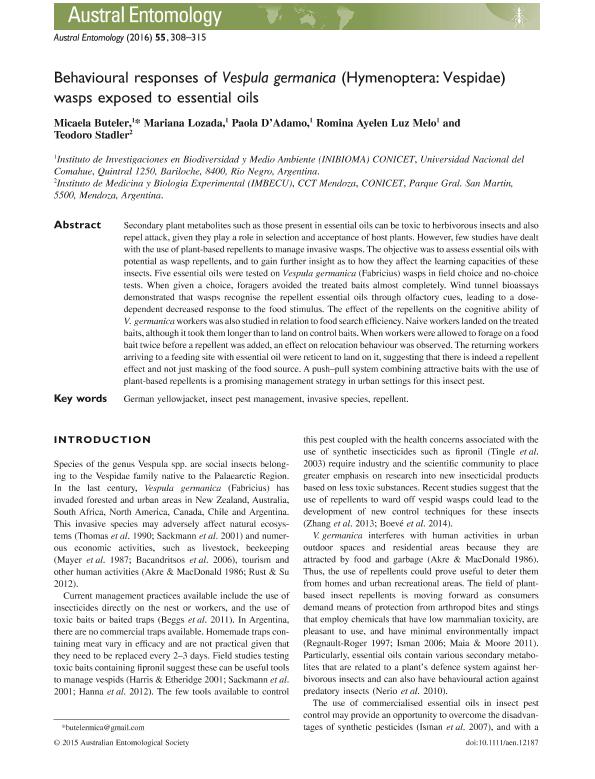Artículo
Behavioural responses of Vespula germanica (Hymenoptera: Vespidae) wasps exposed to essential oils
Fecha de publicación:
01/12/2015
Editorial:
Blackwell Publishing
Revista:
Austral Entomology
ISSN:
2052-174X
e-ISSN:
2052-1758
Idioma:
Inglés
Tipo de recurso:
Artículo publicado
Clasificación temática:
Resumen
Secondary plant metabolites such as those present in essential oils can be toxic to herbivorous insects and also repel attack, given they play a role in selection and acceptance of host plants. However, few studies have dealt with the use of plant-based repellents to manage invasive wasps. The objective was to assess essential oils with potential as wasp repellents, and to gain further insight as to how they affect the learning capacities of these insects. Five essential oils were tested on Vespula germanica (Fabricius) wasps in field choice and no-choice tests. When given a choice, foragers avoided the treated baits almost completely. Wind tunnel bioassays demonstrated that wasps recognise the repellent essential oils through olfactory cues, leading to a dose-dependent decreased response to the food stimulus. The effect of the repellents on the cognitive ability of V. germanica workers was also studied in relation to food search efficiency. Naive workers landed on the treated baits, although it took them longer than to land on control baits. When workers were allowed to forage on a food bait twice before a repellent was added, an effect on relocation behaviour was observed. The returning workers arriving to a feeding site with essential oil were reticent to land on it, suggesting that there is indeed a repellent effect and not just masking of the food source. A push–pull system combining attractive baits with the use of plant-based repellents is a promising management strategy in urban settings for this insect pest.
Palabras clave:
German Yellowjacket
,
Insect Pest Management
,
Invasive Species
,
Repellent
Archivos asociados
Licencia
Identificadores
Colecciones
Articulos(INIBIOMA)
Articulos de INST. DE INVEST.EN BIODIVERSIDAD Y MEDIOAMBIENTE
Articulos de INST. DE INVEST.EN BIODIVERSIDAD Y MEDIOAMBIENTE
Citación
Buteler, Micaela; Lozada, Mariana; D'adamo, Paola; Melo, Romina Ayelén Luz; Stadler, Teodoro; Behavioural responses of Vespula germanica (Hymenoptera: Vespidae) wasps exposed to essential oils; Blackwell Publishing; Austral Entomology; 55; 3; 1-12-2015; 308-315
Compartir
Altmétricas




